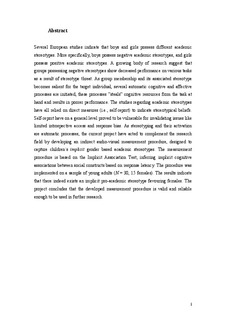Exploring the academic gender gap - Developing a measure of children's implicit academic stereotypes
Master thesis
Permanent lenke
http://hdl.handle.net/11250/293012Utgivelsesdato
2015Metadata
Vis full innførselSamlinger
- Institutt for psykologi [3103]
Sammendrag
Several European studies indicate that boys and girls possess different academic
stereotypes. More specifically, boys possess negative academic stereotypes, and girls
possess positive academic stereotypes. A growing body of research suggest that
groups possessing negative stereotypes show decreased performance on various tasks
as a result of stereotype threat. As group membership and its associated stereotype
becomes salient for the target individual, several automatic cognitive and affective
processes are initiated, these processes ”steals” cognitive resources from the task at
hand and results in poorer performance. The studies regarding academic stereotypes
have all relied on direct measures (i.e., self-report) to indicate stereotypical beliefs.
Self-report have on a general level proved to be vulnerable for invalidating issues like
limited introspective access and response bias. As stereotyping and their activation
are automatic processes, the current project have acted to complement the research
field by developing an indirect audio-visual measurement procedure, designed to
capture children´s implicit gender based academic stereotypes. The measurement
procedure is based on the Implicit Association Test; inferring implicit cognitive
associations between social constructs based on response latency. The procedure was
implemented on a sample of young adults (N = 30, 15 females). The results indicate
that there indeed exists an implicit pro-academic stereotype favouring females. The
project concludes that the developed measurement procedure is valid and reliable
enough to be used in further research.
